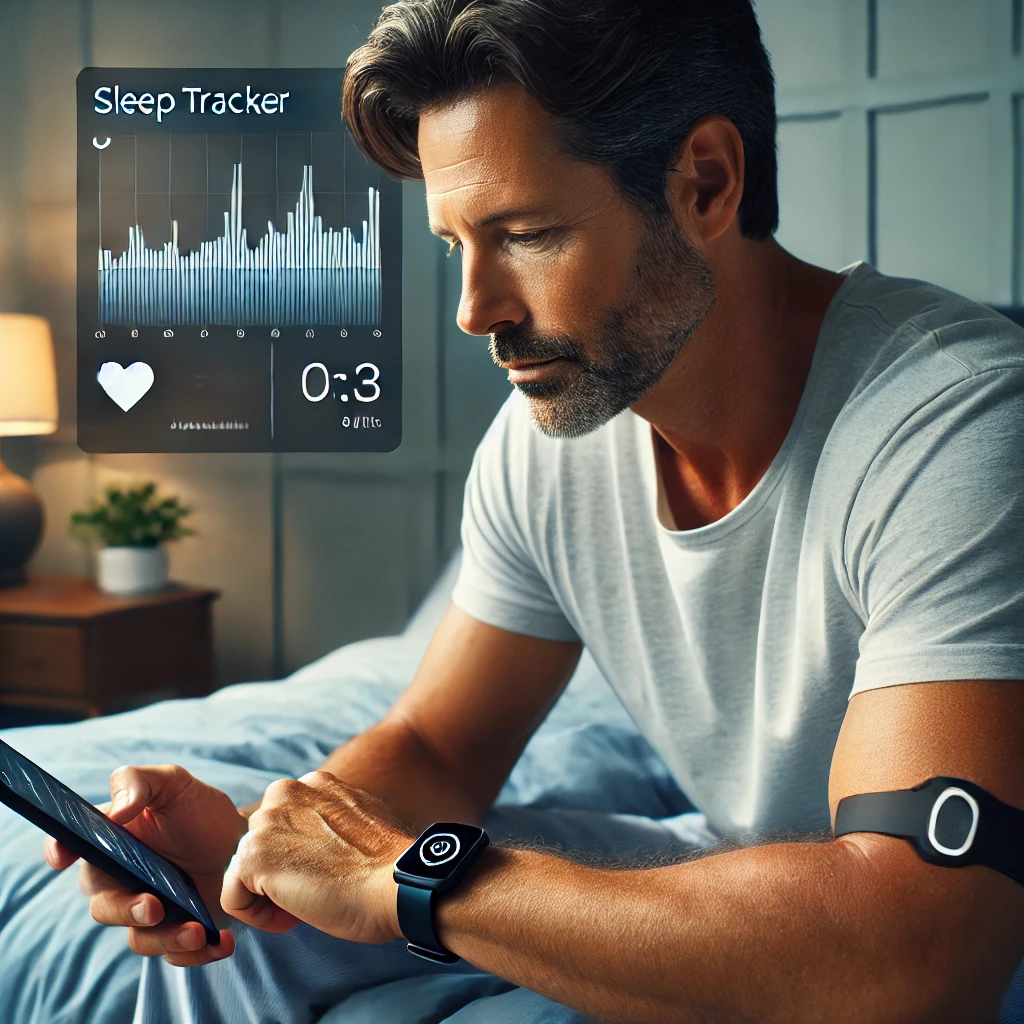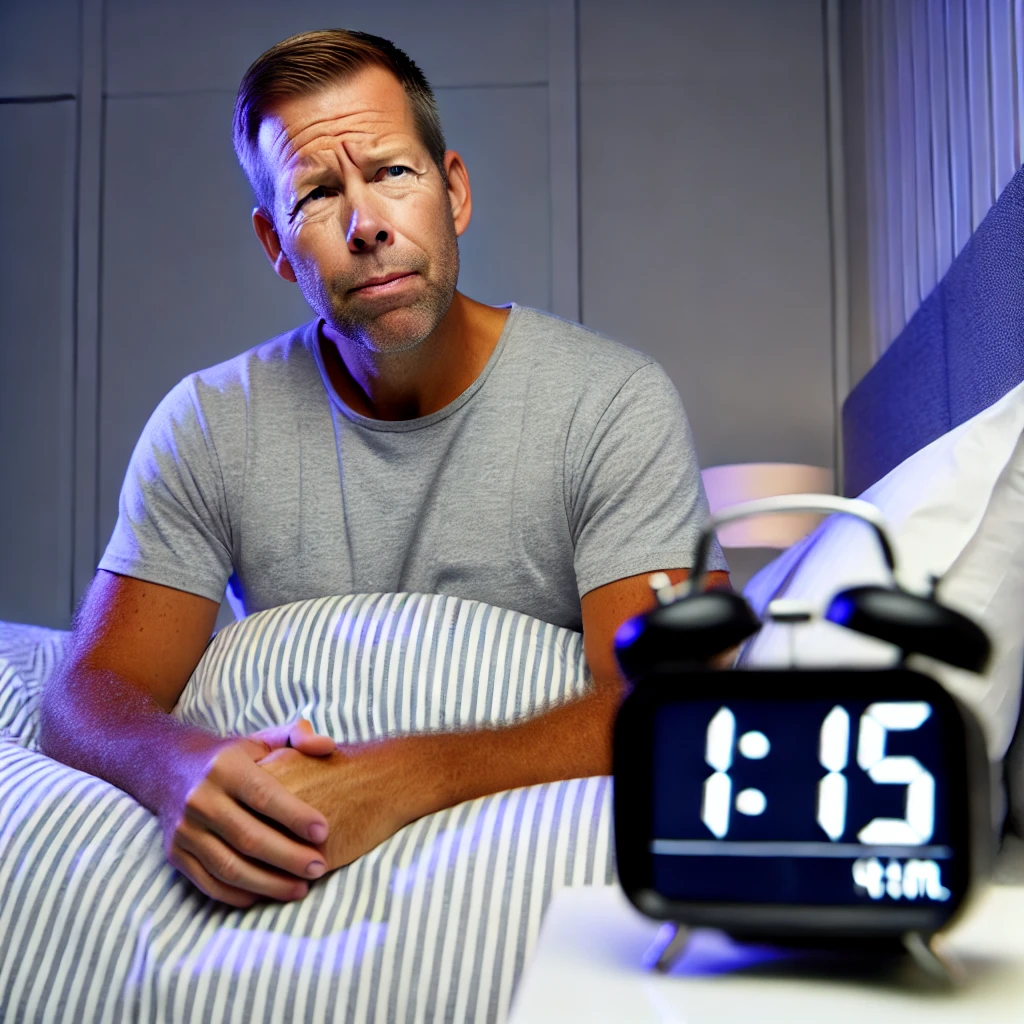Does sleep improve testosterone levels? Massively. When it comes to boosting testosterone naturally and addressing potential low testosterone symptoms, most people think of exercise, diet, or perhaps a cocktail of supplements. But often overlooked is the simplest, most effective testosterone booster of all: quality sleep.
It’s not just about getting rest—sleep plays a crucial role in hormone regulation, particularly testosterone, which peaks during sleep and drops as we wake. Scientific research has shown that even a single week of poor sleep can decrease testosterone levels by up to 15% . So, if you’re looking to enhance your testosterone naturally, making sleep a priority is a no-brainer.
I’ve always been a terrible sleeper. If I’m honest, great sleep does elude me more often than not. In general, I have improved my quality of sleep by using some of the below tips. without at least attempting to improve your sleep, no amount of supplement or any other action taken will naturally increase testosterone.
Key Takeaways
- Sleep Quality Matters: It’s not just about the hours you’re in bed. Create a sleep-friendly environment and avoid disruptions to improve sleep quality and support healthy testosterone levels.
- Diet and Lifestyle Choices Impact Sleep: Caffeine and sugar can disrupt sleep and elevate cortisol. Choose protein-rich snacks to stabilise blood sugar and support restful sleep.
- Consistency Is Key: Going to bed and waking up at the same time each day keeps your circadian rhythm in check, promoting steady testosterone levels.
- Stress Management is Crucial: High cortisol from stress can prevent you from reaching deep and REM sleep stages. Use relaxation techniques to reduce stress and improve sleep quality.
- Leverage Sleep Trackers for Insight: Sleep trackers like the Oura Ring or Fitbit can highlight patterns and disruptions, helping you optimise sleep and improve overall health.
Impact of Sleep on Hormone Production
Most view sleep as downtime, but it’s an active period when your body is at its most productive—particularly for hormone production. Testosterone, like other hormones, follows a circadian rhythm—a 24-hour cycle that mirrors our sleep-wake pattern. During sleep, testosterone levels rise, peaking in the early morning hours around 4 to 8 a.m. .
If you skimp on sleep or have poor sleep quality due to disorders like insomnia or obstructive sleep apnea (OSA), you’re essentially hitting the brakes on testosterone production. Sleep fragmentation prevents your body from entering the deeper stages of sleep . This is where most testosterone is produced, disrupting the cycle entirely.
If you’re lacking in sleep, it’s a double edged sword of less testosterone and the general awful feeling/biological impact of little sleep.
Sleep is not merely a state of rest but a dynamic process that influences hormone release, including testosterone. The brain’s hypothalamus controls the circadian rhythm and directs the production of key hormones during various sleep stages.” – Harvard Medical School, Sleep Medicine Research Division
The Science of Sleep Architecture and Hormonal Balance
To understand the relationship between sleep and testosterone, it’s essential to know how your body processes sleep. There are several stages, each playing a role in your hormonal health:
1. Non-REM Sleep (Stages 1 to 4): This initial period is crucial for releasing growth hormone, aiding muscle repair and fat metabolism.
2. REM Sleep: This is where the magic happens. REM sleep, the deepest sleep stage, is when your body releases the highest amount of testosterone .
Lack of quality sleep reduces time spent in REM sleep, causing testosterone production to drop significantly. Over time, this not only affects testosterone but can also lead to mood swings, muscle loss, and decreased libido.
REM sleep and deep sleep stages are critical for testosterone production. Interruptions in these sleep stages can cause a decrease in overall testosterone levels, as studies show disrupted sleep patterns significantly lower male testosterone production.” – Eve Van Cauter, Professor at University of Chicago Sleep Center
How Sleep Trackers Can Support Testosterone Levels

With all the focus on REM and deep sleep, how do you know if you’re actually getting enough of it? This is where sleep trackers come into play. Devices like the Oura Ring, WHOOP band, Apple Watches, Garmin Watches and various Fitbit models aren’t just about tracking your steps—they’re powerful tools for monitoring sleep quality.
These trackers measure metrics such as heart rate variability (HRV), total time spent in different sleep stages, and disruptions throughout the night. By tracking how much time you’re spending in deep and REM sleep, these devices can provide a clear picture of whether your sleep patterns are aligned with optimal hormone production.
For example, if your tracker shows that you’re consistently missing out on REM sleep, this could indicate a need to adjust your sleep routine or explore underlying issues like stress or sleep disorders. Similarly, if you notice a drop in HRV (a marker of overall recovery and stress), it may suggest that your body isn’t entering the restorative stages of sleep effectively .
While sleep trackers can’t measure testosterone directly, they can highlight patterns that correlate with hormonal health. For anyone looking to optimise testosterone levels naturally, leveraging this data to make informed decisions about sleep quality is a game-changer.
Why Sleep Trackers Are Not a Complete Solution
It’s important to note that while sleep trackers can provide useful insights, they are not a substitute for medical advice or professional sleep studies. If your sleep tracker indicates persistent issues like lack of REM or deep sleep, consulting a healthcare professional for more comprehensive evaluation and treatment options would be the next logical step.
If you’re interested in what sleep trackers are best, I’d certainly head on over to The Quantified Scientist’s YouTube channel. This gent has the most through fitness/sleep device testing out there.
Circadian Rhythms and Testosterone Production
Testosterone levels don’t remain constant throughout the day—they follow a circadian rhythm, peaking in the morning and gradually decreasing throughout the day. Consistent sleep patterns help regulate this rhythm, ensuring optimal hormone production. Disrupting this cycle by staying up late or sleeping irregular hours can lead to a flattened rhythm, where testosterone levels don’t peak in the morning as they should .
Morning Highs: Testosterone typically peaks in the early morning, providing the energy and focus to tackle the day.
Evening Lows: By evening, levels naturally decline as your body prepares for rest. Any disruption to this cycle reduces overall testosterone production, leaving you with less energy, lower strength, and a dip in mood .
Circadian rhythms, regulated by the suprachiasmatic nucleus (SCN) in the brain, are crucial for maintaining testosterone levels. Disruptions in sleep timing due to irregular sleep patterns can lead to a loss of testosterone’s natural morning peak, resulting in mood swings and lower energy levels throughout the day.” – Harvard Medical School’s Sleep Regulation Research Team
Research Findings: Does Sleep Improve Testosterone Levels?
The connection between sleep and testosterone isn’t just a minor detail—it’s a crucial factor that can significantly influence how you feel, function, and even age. Research conducted by the University of Chicago found that men who got less than five hours of sleep a night for one week experienced a testosterone decline of up to 15%. That’s not just a minor dip; it’s equivalent to having the hormonal health of a man ten years older .
For men of any age, the consequences of poor sleep go beyond just feeling a bit tired. Reduced testosterone due to insufficient sleep can affect everything from muscle mass and energy levels to libido and overall mood. Another study revealed that men with obstructive sleep apnoea (OSA)—a condition characterised by frequent interruptions in breathing—had significantly lower testosterone levels. When these men received treatment, not only did their sleep quality improve, but their testosterone levels also saw a notable increase .
It’s not just middle-aged men who are impacted by sleep deprivation. Younger men in their 20s and 30s can experience the same adverse effects if their sleep patterns are inconsistent or their quality of sleep is poor. This shows that no matter your age, neglecting sleep can set you back years in terms of hormonal health.
A study from the University of Chicago found that sleep deprivation led to a decline in testosterone levels by up to 15%, equivalent to the hormonal age acceleration of ten years. This significant drop impacts not only mood but also physical strength and sexual health.” – Esra Tasali, Director of UChicago Sleep Center
Sleep Quality vs. Quantity: Does It Really Matter?
The age-old recommendation to aim for eight hours of sleep each night doesn’t necessarily guarantee optimal hormonal health. Why? Because it’s not just about the amount of sleep, but the quality of it. Sleep quantity refers to the total time spent in bed, but sleep quality focuses on how much of that time is actually restorative—specifically, time spent in deep sleep and REM sleep stages.
Deep sleep is crucial for the release of growth hormone, which aids muscle recovery and tissue repair, while REM sleep is when most testosterone is produced. Studies show that individuals who spend less time in these stages, even if they log eight hours in bed, often experience lower testosterone levels and wake up feeling less refreshed. This discrepancy is where sleep quality becomes paramount .
If your sleep is fragmented—perhaps due to sleep disorders like OSA or lifestyle factors such as stress or late-night screen time—your body spends more time in light sleep stages and less in deep or REM sleep. This reduces the amount of testosterone your body produces, even if the total sleep duration appears adequate. So, what’s the takeaway? Quantity without quality won’t cut it for maintaining optimal testosterone levels.
Improving sleep quality often requires addressing sleep hygiene. This can involve maintaining a consistent sleep schedule, limiting blue light exposure from screens before bedtime, and creating an environment conducive to uninterrupted sleep. In essence, it’s about making sure that the time you spend in bed is productive in terms of hormonal health, not just a number to hit each night .
The Relationship Between Eating Too Close to Bed and Poor Sleep Quality

Grabbing a snack before bed might seem harmless, but it can seriously mess with your sleep quality and hormone balance. Eating foods high in sugar or refined carbs close to bedtime causes your blood sugar to spike. This spike is followed by a quick drop, often waking you up during crucial sleep stages like REM and deep sleep.
When you wake up during these key stages, your testosterone levels can take a hit. Your body isn’t getting the uninterrupted rest it needs for hormone production. To make things worse, consuming sugary foods elevates cortisol—your body’s main stress hormone. High cortisol levels further disrupt sleep and mess up the balance between testosterone and growth hormone.
The result? Poor sleep quality, reduced testosterone levels, and a groggy start to your day. It’s not just about feeling tired. Over time, these disruptions can lead to bigger issues, like lowered testosterone, mood swings, and impaired muscle recovery.
For better sleep and hormonal health, keep late-night eating light and balanced. Stick to high-protein snacks if you’re hungry. This helps keep blood sugar levels stable, minimising cortisol spikes and supporting deeper, more restorative sleep. In fact, I’ve written a whole blog post on what foods raise testosterone levels the most and the importance of micronutrients for testosterone.
Late-night eating can elevate blood sugar and insulin levels, leading to sleep disturbances. High glycemic meals consumed close to bedtime increase the risk of waking up during critical sleep stages, as the body struggles to balance blood glucose levels.” – Erin Hanlon, Assistant Professor of Medicine at UChicago
Why Sugar and Caffeine Are the Real Culprits
Both sugar and caffeine are common enemies of good sleep, but they impact your body in different ways. Let’s break it down.
- Sugar: Late-night sugar consumption sets off a chain reaction that’s hard to undo. Once your blood sugar spikes, the body produces insulin to manage it. This sudden spike and subsequent drop can wake you up in the middle of the night as the body struggles to maintain stable blood glucose levels. Elevated cortisol levels from sugar also interfere with the production of melatonin, the hormone that signals it’s time to sleep . The result? Poor sleep quality and a reduced ability to recover fully, which hinders optimal testosterone production.
- Caffeine: Caffeine has a sneaky way of lingering in your system long after you’ve finished your cup. With a half-life of about 5-6 hours, caffeine can stay in your system for up to 10-12 hours. Even if you have a cup of coffee at noon, you could still have enough caffeine in your system by bedtime to interfere with sleep stages. Caffeine blocks adenosine receptors in the brain, which are responsible for making you feel sleepy. So, even if you’re in bed for eight hours, you might not be getting the deep and REM sleep necessary for testosterone production.
Tip: Avoid caffeine after midday if you’re sensitive to its effects, and try to limit or eliminate sugary foods in the evening. If you need a late-night snack, opt for something light and high in protein.
Caffeine inhibits adenosine, a chemical that builds up during wakefulness to promote sleepiness. By blocking adenosine receptors, caffeine disrupts the natural sleep-wake cycle, making it difficult to achieve REM sleep necessary for testosterone production.” – Harvard Medical School, Sleep Medicine Research Team
What to Eat If You’re Hungry Before Bed
Feeling peckish before bed doesn’t mean you have to risk your sleep quality. Choose high-protein snacks like Greek yogurt, a small handful of nuts, or a piece of turkey. Protein helps stabilise blood sugar levels, providing sustained energy without the dramatic highs and lows caused by sugary or carb-heavy foods. It’s also rich in tryptophan, an amino acid that helps boost serotonin and melatonin production, setting the stage for a restful night’s sleep .
The key here is moderation. A heavy meal, even one high in protein, can still disrupt sleep by increasing your heart rate and body temperature. Aim to have your last substantial meal at least 2-3 hours before bedtime. If you must snack, keep it small and protein-focused to avoid that blood sugar rollercoaster.
The Impact of Stress on Sleep Quality

Stress is like that unwelcome guest who refuses to leave—especially when it comes to your sleep. The body’s stress response releases cortisol, a hormone crucial for handling pressure. But when cortisol stays elevated, it becomes a sleep disruptor. High cortisol levels make it hard to unwind, keeping your mind racing and even waking you up at night when your body should be in deep or REM sleep.
Elevated cortisol levels mean less time spent in these vital stages. This directly affects your ability to recover and repair, leading to a vicious cycle of poor sleep and lower testosterone levels. Over time, this can set the stage for a downward spiral of more stress, disrupted sleep, and worsening hormonal health.
Managing stress isn’t just about feeling better—it’s about sleeping better. Techniques like deep breathing, yoga, or even a short evening walk can significantly lower cortisol levels, preparing your body for a restful night. Keeping stress in check gives you the best chance for good sleep, which in turn helps maintain testosterone production. Consider stress management as part of your pre-sleep routine, just like cutting out caffeine or sticking to a consistent bedtime.
Stress increases cortisol levels, which antagonizes the effects of testosterone. Elevated cortisol, particularly at night, reduces the time spent in REM and deep sleep stages—stages essential for testosterone production and overall recovery.” – Diane Lauderdale, Louis Block Professor at UChicago
Practical Tips for a Better Night’s Sleep
It’s not enough to just aim for eight hours in bed. You need quality sleep that allows your body to repair, recover, and produce the right hormones. If your sleep quality is falling short, here’s how to fix it:
- Stick to a Consistent Sleep Schedule. Go to bed and wake up at the same time every day—even on weekends. This keeps your body’s internal clock, or circadian rhythm, aligned. A predictable pattern ensures hormones like testosterone and growth hormone are released at the right times, helping regulate your sleep and overall energy levels.
- Create a Sleep-Friendly Environment. The ideal sleep environment is cool, dark, and quiet. Aim for a room temperature between 15-20°C and use blackout curtains to block light. If noise disrupts your sleep, try earplugs or a white noise machine. These tweaks will help you stay in deep and REM sleep longer, promoting better testosterone production.
- Limit Exposure to Blue Light Before Bed. Blue light from screens can reduce melatonin production, making it harder to fall asleep. Turn off devices at least an hour before bed, or use blue-light-blocking glasses if you can’t. This will help your body transition naturally into sleep mode.
- Reduce Caffeine and Sugar Intake. Caffeine has a half-life of 5-6 hours, meaning it can linger in your system for up to 12 hours. Cut off caffeine intake by midday and avoid sugary foods in the evening. Both elevate cortisol levels, which can disrupt your sleep cycle and testosterone production.
- Manage Stress with a Pre-Sleep Routine. Relaxation techniques like deep breathing, meditation, or yoga before bed can lower cortisol levels. This helps prevent stress from disrupting your sleep and impacting REM stages. A relaxed mind is more likely to slip into quality sleep.
- Opt for High-Protein Snacks Before Bed. If you’re hungry close to bedtime, choose high-protein snacks like Greek yogurt or a small handful of nuts. Protein stabilises blood sugar and contains tryptophan, an amino acid that supports serotonin and melatonin production. This helps you relax and get into deeper sleep without the sugar spikes.
- Exercise, But Not Too Close to Bedtime. Exercise improves sleep quality, but timing matters. Finish workouts at least three hours before bed. Vigorous exercise too close to bedtime can increase heart rate and body temperature, making it hard to fall asleep. Stick to moderate exercise earlier in the day for better results.
FAQs: Does Sleep Improve Testosterone Levels?
1. How does sleep impact testosterone levels?
Sleep plays a vital role in testosterone production. The hormone peaks during deep and REM sleep stages, so if your sleep is fragmented or insufficient, your body produces significantly less testosterone.
2. What’s more important: sleep quality or sleep quantity?
Both matter, but quality trumps quantity. You can log eight hours in bed, but if you’re not getting enough deep or REM sleep, your testosterone levels will suffer. Prioritise uninterrupted, restorative sleep for the best results.
3. How much sleep should I aim for to support testosterone?
Aim for 7–9 hours of quality sleep each night. Consistency is key—going to bed and waking up at the same time daily helps regulate your circadian rhythm and ensures steady hormone production.
4. Does poor sleep really lower testosterone that much?
Yes. Research shows that just one week of poor sleep (less than five hours a night) can lower testosterone levels by up to 15%, equivalent to ageing ten years hormonally.
5. Can stress affect sleep and testosterone?
Absolutely. Elevated cortisol levels from stress disrupt deep and REM sleep stages, reducing testosterone production. Managing stress through relaxation techniques or pre-sleep routines is crucial for better sleep and hormonal health.
6. Do sleep trackers help improve testosterone levels?
While sleep trackers can’t measure testosterone directly, they provide valuable insights into your sleep quality. Devices like the Oura Ring or Fitbit can highlight patterns and disruptions, helping you optimise sleep and, indirectly, testosterone.
7. What should I avoid before bed to improve sleep and testosterone?
Avoid caffeine, sugar, and heavy meals late at night. These disrupt your sleep cycle and hormone balance. Stick to light, high-protein snacks if you’re hungry to stabilise blood sugar and support restful sleep.
8. How can I improve my sleep quality naturally?
• Stick to a consistent sleep schedule.
• Limit blue light exposure an hour before bed.
• Create a sleep-friendly environment (cool, dark, and quiet).
• Manage stress with relaxation techniques like meditation or yoga.
• Avoid vigorous exercise close to bedtime.
Conclusion: Sleep—The Forgotten Key to Testosterone Mastery
Thanks for reading does sleep improve testosterone levels. Prioritising sleep is one of the most effective ways to naturally boost testosterone. How can you raise testosterone naturally like me? Get this right. It’s not just about the hours you spend in bed, but the quality of that sleep. Whether it’s setting up the right environment, managing stress, or making better dietary choices, each small change helps you sleep better and maintain healthy hormone levels.
By making sleep a priority, you’re giving your body the rest it needs to function optimally. Combine these strategies with a consistent sleep schedule and the right diet, and you’ll set yourself up for improved sleep quality and enhanced hormonal health.
With these practical tips, you can transform your sleep habits and experience the profound benefits that come from a night of true, quality rest.
Chat soon,
Matt


6 thoughts on “Does Sleep Improve Testosterone Levels? [Facts You Need to Know]”
Comments are closed.